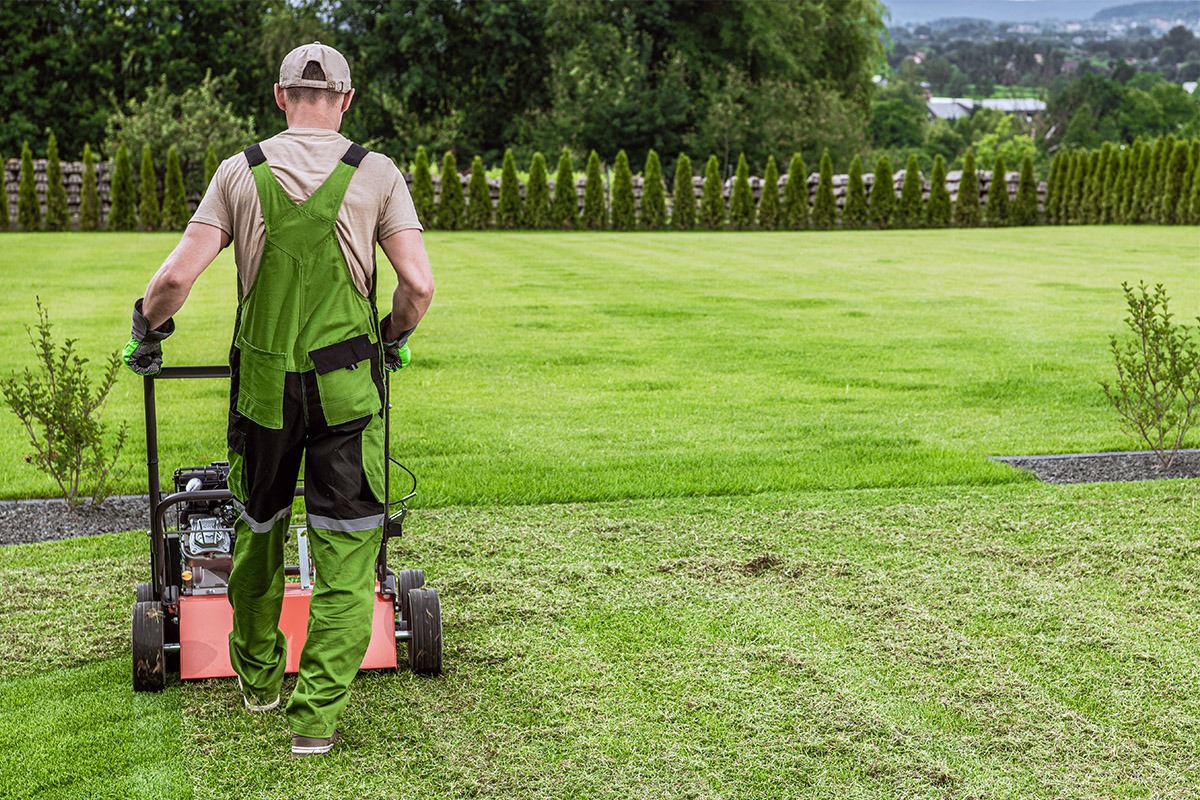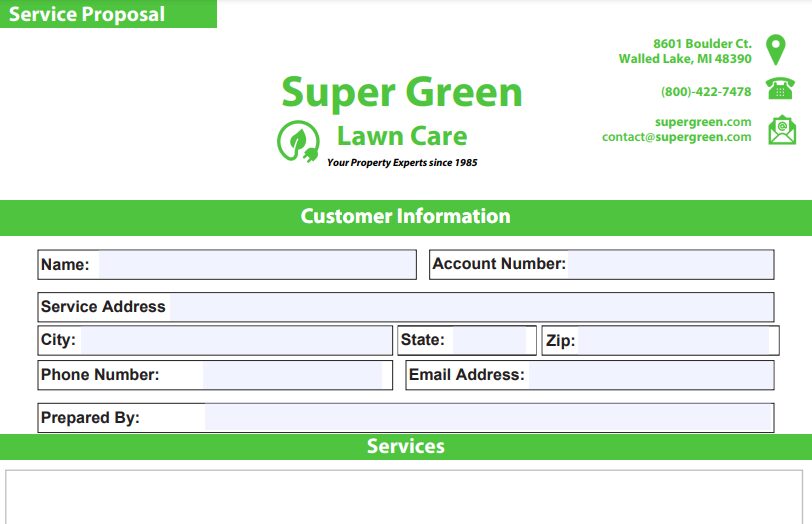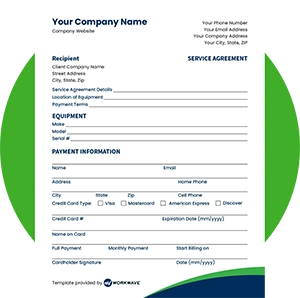When you run a home service-oriented business like lawn care, contracts are essential. They protect your interests as well as your customers’, they help protect you against potential liabilities, and they set up clear expectations between you, the service provider and your residential or commercial clients. With residential clients, a contract is an agreement between a service provider and a property owner or resident; commercial clients are businesses or organizations that hire a lawn care business and usually have more complex contracts. Creating a professional, comprehensive lawn care contract template that you can use for either residential or commercial clients can be challenging, but it’s extremely important. In this post, we’ll go over lawn care service contracts – what you should include, how to create them and how to properly use them.

What is a Lawn Care Contract and Why is it Important?
Lawn care contracts are legal agreements between a lawn care service provider and an individual or business seeking those services. These contracts serve as protection for both parties by clearly outlining the terms and conditions of the agreement, including payment details, job duties, scheduling, scope of work and more. They are important to ensure that all expectations are met and any potential disputes can be resolved quickly and easily.
Lawn Care vs. Landscaping Services Contracts
Lawn care and landscaping are two distinct services: Lawn care typically involves mowing, edging, fertilizing, weed control and aeration. Landscaping services include landscape design, installation of trees or shrubs, lighting or irrigation systems and other property enhancements. Because of these differences, the contracts for lawn care vs landscaping services will look different. In a landscaping contract, you’ll need to clearly outline the scope of services provided and any associated costs – you should provide detailed descriptions of each service being offered, supplies and equipment used, and a clear timeline for completion so there are no surprises down the line.
What to Include in Your Lawn Care Contract
Crafting a comprehensive lawn care contract is crucial for both providers and clients to ensure clarity, accountability, and mutual understanding. Such contracts not only outline the scope of services but also establish important terms and conditions that govern the working relationship. Below are key elements to include in your lawn care contract, ensuring a smooth and mutually beneficial partnership.
1. Details of parties involved
At the beginning of the contract, include the full legal names and addresses of all parties involved, including the contractor’s address and the client’s name and address. For a residential contract, this is fairly straightforward (make sure your client’s name is spelled correctly and you have their address correct); for a commercial contract, it’s important to make sure the company’s name and address are 100% accurate – for example, if the company’s legal name is Acme Industries, Inc., make sure that is exactly how you have them listed on the contract. Not Acme Industries or Acme Industries Incorporated. Small details like this are important when creating a contract. You’ll be providing additional details further on in the contract.
2. Contract Scope and Services
Next, outline the scope of services your lawn care business will provide, including specific tasks, frequency, and duration. This ensures that the customer knows exactly what services will be provided as well as when they can expect them. A typical list of services may include lawn mowing, edging, weeding and debris removal, and pest control. In this section you should also mention any limitations or exclusions in the service provisions; for example, if you have to delay service due to extreme weather.
3. Pricing and Payment Terms
Outline and define your expected payment structure for lawn care services in your contract. This should include specifying any fixed monthly fees (for example, $50/month for lawn mowing and edging services) along with any additional costs such as materials or labor ($25/hour per technician on the job). Be sure to include your payment terms, clearly stating when payments are due, accepted payment methods, and how you will handle late payments. You may want to include a clause that allows you to make claims for non-payment if the client does not meet your agreed-upon terms. It’s also important to note that late payments will be penalized in some way and to include those details in the contract, whether you want to charge interest or a flat fee for late or non-payments. Finally, all parties should agree on how much will be due at the end of any lawn care or landscaping project and this should be clearly stated in the contract as well.
4. Duration and Termination
Include a duration and termination clause within your contract. Start with the duration of the contract – is it seasonal? Annual? – and specify the expected end date of the contract, so each party knows when the agreement is over. It should also note any conditions that permit either side to terminate the contract early – if there is a breach by one party or changes in circumstances that would warrant early termination. Establish notice periods to allow each responsible party enough time to rectify any issues or end the contract. It’s also a good idea to include provisions for what happens in the case of early termination so that each side understands their rights and responsibilities if that situation should arise.
5. Liability and Insurance
It is important to include liability and insurance terms within the contract to make sure everyone understands the associated safety risks – outlining liability for injuries or property damage incurred while on the job providing lawn care services. Make sure you have proper insurance coverage to protect yourself from any legal action in case any such claims arise. Additionally, include an indemnification clause to protect yourself and independent contractors you might use against any legal claims.
6. Client Responsibilities
Be sure to also include the client’s responsibilities in the contract – what they need to provide to receive optimal service. This may include providing access to the property and any preparations that might be necessary before service begins (Is there a locked gate or fence? Do they keep a pet in the yard? Etc.), and addressing expectations for proper care and maintenance by the client.
7. Dispute Resolution and Governing Law
Your contract should also include a dispute resolution clause that outlines the process for resolving potential conflicts. First, determine the governing law and jurisdiction that will be applied to any dispute. Next, consider and include alternative resolution methods like mediation or arbitration, which can be used as informal and cost-effective approaches to resolving issues without having to get the full legal system involved. Finally, include details on how to enforce any decision made through mediation or arbitration, which will help ensure that everyone will adhere to the outcome of the process.
8. Confidentiality and Non-Disclosure
You can ensure the protection of sensitive information and trade secrets by including confidentiality and/or non-disclosure clauses in your contract. These clauses stipulate what information must remain private, often including financial details, strategic plans, customer information, and other trade secrets. They may also include a provision for legal action if any of the confidential information is made public without express permission.
9. Additional Contract Provisions
In addition to everything else you’ve included in your contract, there may be certain remaining provisions that are specific to your client’s particular needs. These can include considerations like property access, equipment storage, or other relevant factors. Outline these separately from the core agreement so they don’t interfere with any of the main clauses or conditions. Make sure all additional provisions are written into the agreement in clear and specific language so both parties understand their scope and implications.
10. Signatures and Execution
Finally, leave space for both parties to sign and date the contract to show that the parties agree to the terms, and provide a copy of the contract for each party.
Free Lawn Care Contract Template [Download]
Enhance your lawn care business operations with our free, customizable contract template. Designed to streamline the contracting process, our template provides a comprehensive framework for outlining service agreements, pricing, and terms. Download now to simplify your contract management and ensure clear communication with your clients.

Different Types of Contracts in the Lawn Care Industry
Various types of lawn care industry contracts cater to the diverse needs of both providers and clients. From seasonal arrangements to annual contracts and per-service options, each offers unique advantages tailored to maintaining vibrant green spaces. Let’s dive deeper into them:
Seasonal Agreements:
These contracts cater to clients needing services for specific parts of the year, focusing on seasonal lawn care needs. They typically cover services such as spring cleanup, summer mowing, fall leaf removal, and winterizing.
Benefits include:
- Predictable income for lawn care providers during peak seasons.
- Clients receive specialized care tailored to the specific needs of each season.
Annual Contracts:
Annual contracts provide year-round maintenance, offering a comprehensive approach to lawn care across all seasons. Services are typically scheduled on a regular basis throughout the year, ensuring consistent upkeep.
Benefits include:
- Long-term commitment from clients, providing stability for lawn care businesses.
- Clients enjoy hassle-free maintenance without the need to renegotiate terms each season.
Per-Service Contracts:
Tailored for one-time or occasional services, per-service contracts offer flexibility for both the provider and the client. Clients can request specific services as needed without committing to long-term contracts.
Benefits include:
- Flexibility for clients to customize their lawn care based on changing needs or budgets.
- Providers can accommodate varying schedules and workloads without the constraints of fixed-term agreements.
Each type of contract in the lawn care industry serves distinct needs and preferences, providing options for both providers and clients to effectively manage their lawn care arrangements.

Best Practices for Lawn Service Agreements
To ensure a smooth and transparent process, it’s crucial to discuss the lawn service agreement with your client before finalizing and sending the contract for signing. This ensures that both parties are on the same page regarding the services provided and the terms outlined in the contract. Below are some best practices to consider when crafting your lawn service agreements:
Discuss with the client prior to sending the contract
Before you complete and send the contract to be signed, have a conversation with your client to talk about the services provided and the terms of the contract. You don’t want them to be surprised by anything in the contract!
Go into detail on your lawn care services
Be sure you’re specific about the services you’ll be providing; you want full transparency with your client. For example, instead of simply saying “lawn mowing services,” you’ll want to expand on that. “We will mow your lawn every 5-7 days; this service will include blowing away all clippings and trimming the edges.” You want them to have an exact idea of what to expect.
Consider safety and liability limitations
Your client should know that safety risks are your responsibility and not theirs, but with that said, be sure you protect yourself and your business with proper insurance and a limited liability clause.
Nail-down payment terms and schedules
Clearly outline your payment terms and expectations to help ensure that you are paid in a timely manner for your work. A typical payment term is within 30 days of services rendered or receipt of the invoice.
Decide on equipment and materials used
Determine which equipment and supplies will be used and clearly outline the responsibilities involved, especially if the client will be providing their own equipment or any of the supplies.
Use online software to easily get electronic signatures
Using field service software that can help you compose and execute contracts can be extremely helpful. Many software programs even make it easy to send documents via email or text and collect electronic signatures. This kind of automation is a great way to create efficiencies, saving time and money.
What are the Benefits of Lawn Care Service Contracts?
Lawn care service contracts offer numerous advantages for both providers and clients alike. Understanding these benefits can help individuals make informed decisions when seeking or offering lawn care services.
-
Consistent Maintenance:
One of the primary benefits of lawn care service contracts is the assurance of consistent maintenance throughout the year. Annual contracts, in particular, ensure that properties receive regular attention, leading to healthier and more aesthetically pleasing lawns.
-
Predictable Costs:
Service contracts often provide clarity regarding pricing, allowing clients to budget effectively for their lawn care needs. With predetermined costs for services outlined in the contract, clients can avoid unexpected expenses and financial surprises.
-
Long-Term Commitment:
For providers, securing clients through annual contracts fosters long-term relationships and stability. This commitment ensures a steady stream of income and allows providers to plan their schedules and resources accordingly.
-
Customized Services:
Service contracts can be tailored to meet the specific needs of each property. Whether it’s seasonal services, specialized treatments, or additional landscaping tasks, contracts can outline precisely what services will be provided, ensuring client satisfaction.
-
Priority Scheduling:
Clients with service contracts often receive priority scheduling, especially during peak seasons. This ensures that their lawn care needs are addressed promptly and efficiently, without having to wait for availability.
-
Peace of Mind:
Knowing that their property is being cared for by professionals under a service contract can provide clients with peace of mind. They can trust that their lawn is in good hands, allowing them to focus on other aspects of their lives without worrying about maintenance.
Learn How RealGreen’s Lawn Care Software Can Automate Invoicing and Payment Processing for Your Business
RealGreen’s Lawn Care Software is built for businesses like yours, helping you simplify and automate your day-to-day processes while also automating everything from marketing to scheduling to invoicing and payments. Schedule a free demo today!


Download Free Templates for Your Business
Use our free, downloadable templates to quickly create proposals, estimates, contracts, work orders, invoices and receipts for your field service business.
We’ve included templates for lawn care, landscaping, arbor care, irrigation, snow removal and pest control. Easily customize each form to create professional-looking documents.


